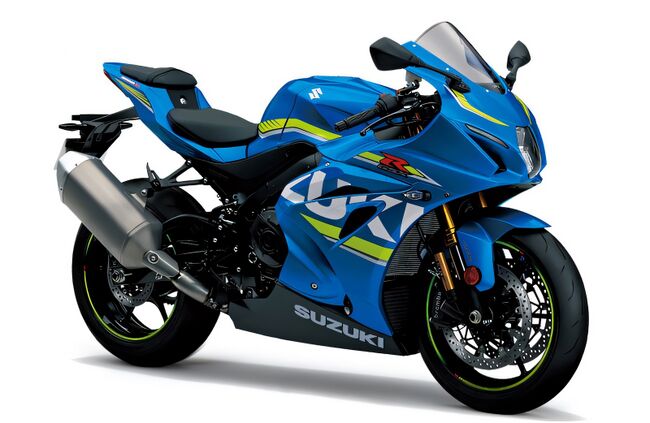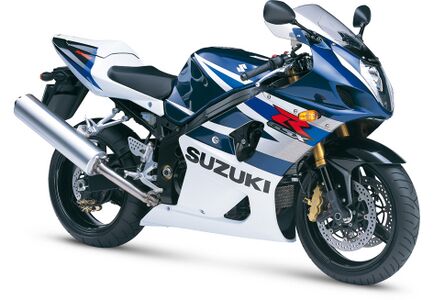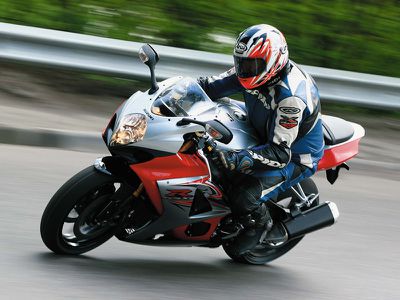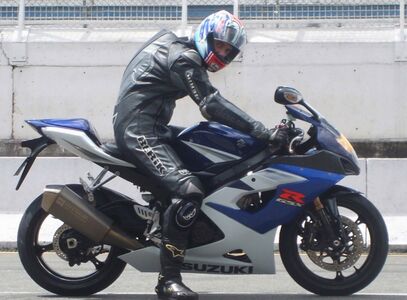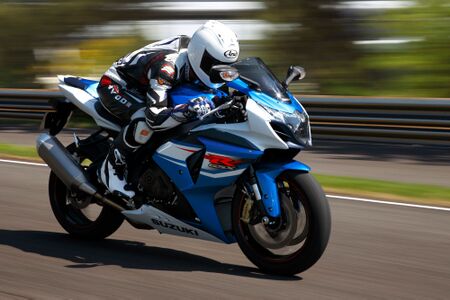Difference between revisions of "Suzuki GSX-R1000"
m (→Photos) |
m (→Photos) |
||
| (One intermediate revision by the same user not shown) | |||
| Line 36: | Line 36: | ||
In 2015, modifications with ABS appear. | In 2015, modifications with ABS appear. | ||
| − | In 2017, the Suzuki GSX-R1000 model is undergoing restyling again. In addition to versions with ABS, an R-modification appears - | + | In 2017, the Suzuki GSX-R1000 model is undergoing restyling again. In addition to versions with ABS, an R-modification appears - ''' Suzuki GSX-R1000R '''. It features a quickshifter (up and down), a launch control and a Motion Track Brake System. The updated model Suzuki GSX-R1000 receives the SR-VVT system, which changes the compression ratio of the engine, depending on the rpm; 10-level traction control controlled by the IMU; new braking system (brake discs enlarged to 320 mm, new generation of Brembo monoblock calipers); new Shows BFF front suspension and BFRC Lite rear shock. The engine reduces its stroke and the maximum power rises to 201 hp. |
== Photos == | == Photos == | ||
<gallery mode="packed" heights=200px> | <gallery mode="packed" heights=200px> | ||
| + | File:2004-Suzuki-GSX-R1000a.jpg| | ||
File:KX11 071-073 Page 1 Image 0002 b.jpg| | File:KX11 071-073 Page 1 Image 0002 b.jpg| | ||
File:Suzuki-GSX-R-1000-2006-test.jpg| | File:Suzuki-GSX-R-1000-2006-test.jpg| | ||
Latest revision as of 18:39, 4 September 2023
Suzuki GSX-R 1000 was first introduced in 2001. At that time, the model was used as the basis of the motorcycle Suzuki GSX-R 750, the engine of which was slightly increased in volume, and the frame was thicker by 0.5 mm (which, according to Suzuki, increased the rigidity on 10%).
Lineup:
Main competitors:
In 2002, the model changed slightly, receiving updates on the fuel pump, clutch, front axle and injector (automatic idle appeared).
In 2003, the Suzuki GSX-R1000 model is seriously updated. The frame receives reinforcements, the overall height and seat height are reduced, new 4-piston radial calipers, instead of the usual 6-piston ones, lightweight rims, a new 32-bit control unit, and an LED brake light. Models of this generation feature a black frame, discs and fork coating, an all-titanium exhaust system. Minor engine changes (maximum power increases slightly).
In 2005, the model is undergoing another restyling. The model gets a new engine (power rises to 178 hp), a new exhaust system, larger brake discs and new Tokico calipers, a reduced wheelbase and overall motorcycle length.
2007 - the third major update of the Suzuki GSX-R1000 model. The updated environmental regulations have forced Suzuki to change the exhaust system, which has led to an increase in motorcycle weight. To compensate for this, the company improved the bike's aerodynamics, installed larger throttle bodies and optimized the engine, increasing the maximum power to 185 hp. The model also received the S-DMS (Suzuki Drive Mode Selector) system with a choice of 3 engine operation maps and a hydraulic clutch drive.
In 2009, Suzuki announced another major update to the Suzuki GSX-R1000. The model received a new frame and engine, a new Showa Big Piston Fork (BPF) front fork, new Tokico monobloc front calipers. Models of this generation are distinguished by a double muffler.
The next model update took place in 2012. The Suzuki GSX-R 1000 received an engine update (increased compression ratio, modified camshaft cams, steel exhaust valves, improved crankcase ventilation and reduced losses from the oil pump, updated exhaust internals) and braking system (new Brembo calipers, new brake discs made of heat-resistant stainless steel, reducing the total weight by 130 grams).
In 2015, modifications with ABS appear.
In 2017, the Suzuki GSX-R1000 model is undergoing restyling again. In addition to versions with ABS, an R-modification appears - Suzuki GSX-R1000R . It features a quickshifter (up and down), a launch control and a Motion Track Brake System. The updated model Suzuki GSX-R1000 receives the SR-VVT system, which changes the compression ratio of the engine, depending on the rpm; 10-level traction control controlled by the IMU; new braking system (brake discs enlarged to 320 mm, new generation of Brembo monoblock calipers); new Shows BFF front suspension and BFRC Lite rear shock. The engine reduces its stroke and the maximum power rises to 201 hp.
Photos
Specifications
Specifications Suzuki GSX-R1000:
| Model | Suzuki GSX-R1000 |
|---|---|
| Motorcycle type | sports |
| Release year | 2001+ |
| Frame | aluminum |
| Engine type | 4-cylinder, 4-stroke, in-line |
| Working volume | 988 cc - GSX-R1000 (K1-K4)
999 cm³ - GSX-R1000 (K5 +) |
| Bore / stroke | 73.0 x 59.0 mm - GSX-R1000 (K1-K4)
73.4 x 59.0 mm - GSX-R1000 (K5-K8) 74.5 x 57.3mm - GSX-R1000 (K9-L6) 76.0 x 55.1 mm - GSX-R1000 (L7 +) |
| Compression ratio | 12.0: 1 - GSX-R1000 (K1-K4)
12.5: 1 - GSX-R1000 (K5-K8) 12.8: 1 - GSX-R1000 (K9-L1) 12.9: 1 - GSX-R1000 (L2-L6) 13.2: 1 (with SR-VVT system) - GSX-R1000 (L7 +) |
| Cooling | liquid |
| Number of valves per cylinder | DOHC, 4 valves per cylinder |
| Fuel supply system | Injector, 4x |
| Ignition type | transistor |
| Maximum power | 163.0 h.p. (120.0 kW) @ 10,800 rpm - GSX-R1000 (K1-K2)
164.5 h.p. (121.0 kW) @ 10,800 rpm - GSX-R1000 (K3-K4) 178.0 h.p. (131.0 kW) @ 11000 rpm - GSX-R1000 (K5-K6) 185.0 h.p. (136.0 kW) @ 11000 rpm - GSX-R1000 (K5-K8) 185.0 h.p. (136.0 kW) @ 12000 rpm - GSX-R1000 (K9-L6) 201.0 h.p. (148.5 kW) @ 13200 rpm - GSX-R1000 (L7 +) S-DMS (Suzuki Drive Mode Selector) - GSX-R1000 K7 + Traction Control - GSX-R1000 L7 + |
| Maximum torque | 117.0 Nm (11.9 kg * m) @ 10,800 rpm - GSX-R1000 (L7 +) |
| Gearbox | 6-speed (hydraulic clutch - K7 +) |
| Drive type | chain |
| Front tire size | 120/70-ZR17 (58W) |
| Rear tire size | 190/50-ZR17 (73W) - GSX-R1000 (K1-L6)
190/55-ZR17 (75W) - GSX-R1000 (L7 +) |
| Front brakes | 2 discs, 320mm, 6-piston calipers - GSX-R1000 (K1-K2)
2 discs, 300mm, 4-piston radial calipers - GSX-R1000 (K3-K4) 2 discs, 310mm, Tokico 4-piston radial calipers - GSX-R1000 (K5-L1) 2 discs, 310mm, 4-piston Brembo radial calipers - GSX-R1000 (L2-L6) 2 discs, 320mm, 4-piston Brembo radial calipers - GSX-R1000 (L7 +) opt. ABS - L5 + |
| Rear brakes | 1 disc, 220 mm, 2-piston caliper
opt. ABS - L5 + |
| Front suspension | 43mm KYB Inverted Fork (Fully Adjustable) - GSX-R1000 (K1-K8)
43mm Showa BPF Inverted Fork (Fully Adjustable) - GSX-R1000 (K9 +) 43mm Inverted Showa BFF Fork (Fully Adjustable) - GSX-R1000R (L7 +) |
| Rear suspension | linkage with monoshock (fully adjustable) - GSX-R1000 (K1 +)
Swingarm with monoshock BFRC Lite (fully adjustable) - GSX-R1000R (L7 +) |
| Motorcycle length | 2045mm - GSX-R1000 (K1-K2, K7 +)
2070 mm - GSX-R1000 (K3-K4) 2030 mm - GSX-R1000 (K5-K6) |
| Motorcycle width | 715 mm - GSX-R1000 (K1-K4)
710 mm - GSX-R1000 (K5-K6) 720 mm - GSX-R1000 (K7-L1) 705 mm - GSX-R1000 (L2 +) |
| Motorcycle height | 1135 mm - GSX-R1000 (K1-K2)
1145 mm - GSX-R1000 (K3-K4, L7 +) 1130 mm - GSX-R1000 (K5-L6) |
| Wheelbase | 1410 mm - GSX-R1000 (K1-K4)
1405 mm - GSX-R1000 (K5-K6, K9-L6) 1415 mm - GSX-R1000 (K7-K8) 1420 mm - GSX-R1000 (L7 +) |
| Saddle height | 830mm - GSX-R1000 (K1-K2)
820 mm - GSX-R1000 (K3-K4) 810 mm - GSX-R1000 (K5-L6) 825 mm - GSX-R1000 (L7 +) |
| Minimum ground clearance | 130 mm |
| Acceleration to 100 km / h | 2.35 sec |
| Maximum speed | 286 km / h |
| Fuel tank capacity | 18.0 L - GSX-R1000 (K1-K6)
17.5 L - GSX-R1000 (K7 +) |
| Motorcycle weight (dry) | 170 kg - GSX-R1000 (K1-K2)
168 kg - GSX-R1000 (K3-K4) 166 kg - GSX-R1000 (K5-K6) 172 kg - GSX-R1000 (K7-K8) |
| Motorcycle weight (curb) | 205 kg / 452 lbs - GSX-R1000 (K9-L1, L5-L6 ABS)
203 kg / 447 lbs - GSX-R1000 (L2-L6, L7 + R ABS) 202 kg / 445 lbs - GSX-R1000 (L7 + ABS) |
Documentation
